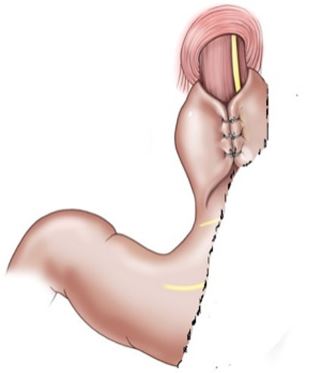A group of French bariatric surgeons from the University Hospital of Montpellier have conducted a pilot study on a new weight loss procedure called Nissen-Sleeve or N-Sleeve. The study was recently published in Surgery for Obesity and Related Diseases journal. The purpose of this hybrid procedure is to prevent acid reflux following gastric sleeve resection in GERD patients. 25 consecutive patients underwent the weight loss procedure from 2013 till 2014. 88% of the patients had a hiatal hernia and underwent a concomitant hiatal hernia repair. 8 patients had Barrett’s esophagus and 10 had esophagitis.
A 3-cm floppy Nissen fundoplication was constructed followed by gastric sleeve resection over bougie. The antrum was preserved and the gastric sleeve resection was extended up to the level of the fundoplication making sure to resect as much as possible of the gastric fundus.
At 6 months and one year 12% of the patients were still experiencing reflux which was proven by endoscopy and pH study. The remaining 22 patients were free of reflux related symptoms. Excess weight loss at one year was comparable to that of a standard gastric sleeve.
At Houston Weight Loss Surgery Center, we believe that a properly performed gastric sleeve surgery results in GERD resolution and is associated with very low leak rate. Therefore, we find no advantage of the Nissen-Sleeve modification. In addition, I think that fundoplication unlike resection, preserves part of the posterior gastric fundus. This in turn may lead to decreased weight loss. Both approaches, however, eliminate the post-prandial gastric accommodation reflex leading to decreased gastric volume, decreased gastric wall compliance and increased gastric emptying. Fundus resection reduces ghrelin secretion but fundus plication preserves gastric leptin function. From a weight loss point of view, the current study has shown equivalence between the traditional gastric sleeve and N-Sleeve. Future studies are needed to corroborate this fact.
The Nissen-Sleeve may play a role in revision gastric sleeve surgery for patient who develop acid reflux after sleeve gastrectomy. At this year, obesity week meeting in New Orleans, an anterior fundoplication post gastric sleeve surgery was shown as a viable option to control post-operative GERD related symptoms. A large retained gastric fundus contributes to acid reflux following gastric sleeve surgery especially in the setting of a hiatal hernia. Gastric fundus resection is a common gastric sleeve revision we perform at Houston Weight Loss Surgery Center and we have had very good results in term of GERD symptom control. Is anterior or posterior fundoplication superior to gastric fundus resection in revision cases? Is the leak rate lower? We hope additional studies coming up in the new year to answer these questions.

